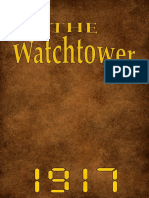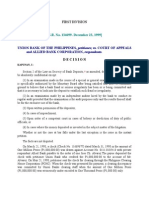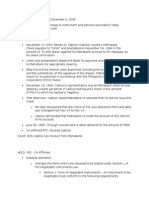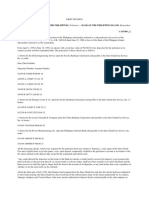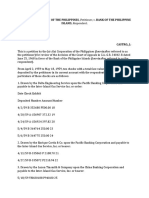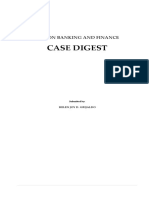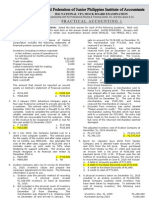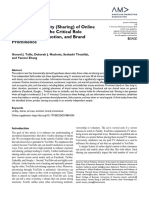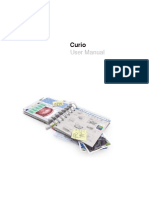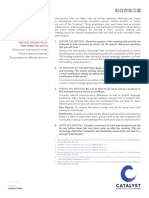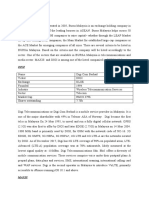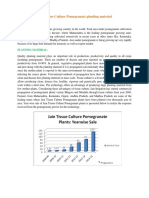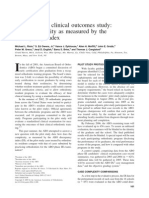Philippine National Bank vs. Court of Appeals
Philippine National Bank vs. Court of Appeals
Uploaded by
Mary Queen Ramos-UmoquitCopyright:
Available Formats
Philippine National Bank vs. Court of Appeals
Philippine National Bank vs. Court of Appeals
Uploaded by
Mary Queen Ramos-UmoquitOriginal Title
Copyright
Available Formats
Share this document
Did you find this document useful?
Is this content inappropriate?
Copyright:
Available Formats
Philippine National Bank vs. Court of Appeals
Philippine National Bank vs. Court of Appeals
Uploaded by
Mary Queen Ramos-UmoquitCopyright:
Available Formats
Philippine National Bank vs.
Court of Appeals
Facts: A check with serial number 7-3666-223-3, dated August 7, 1981 in the amount of P97,650.00 was issued by the Ministry of Education and Culture payable to F. Abante Marketing. This check was drawn against Philippine National Bank (herein petitioner). F. Abante Marketing, a client of Capitol City Development Bank (Capitol), deposited the questioned check in its savings account with said bank. In turn, Capitol deposited the same in its account with the Philippine Bank of Communications (PBCom) which, in turn, sent the check to petitioner for clearing.Petitioner cleared the check as good and, thereafter, PBCom credited Capitols account for the amount stated in the check. However, petitioner PNB returned the check to PBCom and debited PBComs account for the amount covered by the check, the reason being that there was a material alteration of the check number.PBCom, as collecting agent of Capitol, then proceeded to debit the latter s account for the same amount. On the other hand, Capitol could not, in turn, debit F. Abante Marketings account since the latter had already withdrawn the amount of the check. Issue: Whether or not an alteration of the serial number of a check is a material alteration under the negotiable instruments law. Held: No. An alteration is said to be material if it alters the effect of the instrument. It means an unauthorized change in an instrument that purports to modify in any respect the obligation of a party or an unauthorized addition of words or numbers or other change to an incomplete instrument relating to the obligation of a party.In other words, a material alteration is one which changes the items which are required to be stated under Section 1 of the Negotiable Instrument Law. The case at the bench is unique in the sense that what was altered is the serial number of the check in question, an item which, it can readily be observed, is not an essential requisite for negotiability under Section 1 of the Negotiable Instruments Law. The aforementioned alteration did not change the relations between the parties. The name of the drawer and the drawee were not altered. The intended payee was the same. The sum of money due to the payee remained the same.If the purpose of the serial number is merely to identify the issuing government office or agency, its alteration in this case had no material effect whatsoever on the integrity of the check. The identity of the issuing government office or agency was not changed thereby and the amount of the check was not charged against the account of another government office or agency which had no liability under the check.Petitioner, thus cannot refuse to accept the check in question on the ground that the serial number was altered, the same being an immaterial or innocent one.
Metrobank vs. Renato Cabilzo
Facts: On November 12, 1994, Renatod Cabilzo issued a Metrobank check no. 985988, payable to "CASH" and posdated on November 24, 1994 in the amount of P1000.00.The check was drawn against Cabilzo's Account with Metrobank PasongTamo Branch under Current Account No. 61804487-3 and was paid by Cabilzo to a certain Mr. Marquez, as his sales commission. The check was presented to Westmont Bank for payment. Westmont Bank, in turn, indorsed the check to Metrobank for appropriate clearing. After the entries thereon were examined, including the availability of funds and the authenticity of the signature of the drawer, Metrobank cleared the check for encashment in accordance wit the PCHC rules. On November 16, 1994, Cabilzo's representative was at Metrobank Pasong Tamo Branch when a bank personnel asked him if Cabilzo had issued a check in the amount of P91,000.00 to which he said no. On same date, Cabilzo himself called Metrobank to reiterate that he did not issue a check with such amount and requested that the said check be returned to him for verification, and Metrobank complied. Upon receipt of the check, Cabilzo discovered that the Metrobank check no. 985988 which he issued on November 12, 1994 in the amount of P1,000 was altered to P91,000.00 and the date November 24, 1994 was changed to November 14, 1994. Cabilzo demanded that Metrobank recredit the amount of P91,000 60 his account. Metrobank refused reasoning that it has to refer the matter first to its Legal Division for appropriate action. Repeated demands followed but Metrobank still failed to comply. On June 30, 1995, Cabilzo, thru counsel, finally sent a letter-demand to Metrobank for the payment of P90,000.00 after deducting the original value of the check which is P1,000.00. Despite said demand, Metrobank still failed to comply. Consequently, Cabilzo instituted a civil action for damages against Metrobank before RTC of Manila. For its part, Metrobank countered that upon ther receipt of the check through PCHC on November 14, 1994, it examined the genuiness and the authenticity of the drawer's signature and the technical entries on the check to determine if there were alterations, erasures, superimpositions or intercalations but none was noted. Metrobank also claimed that as a collecting bank and the last indorser, Westmont Bank should be held liable for the value of the check. Westmont bank indorsed the check as the an unqualified indorser, by virtue of which it assumed the liability of a general indorser, and thus, among others, warranted that the instrument is genuine and in all respect what it purports to be.In addition, Metrobank claimed that Cabilzo was partly responsible in leaving spaces on the check, which made the fraudulent insertion of the amount and figures thereon, possible. On account of his negligence in the preparation and issuance of the check which was the proximate cause of the loss, Cabilzo cannot thereafter claim indemnity by virtue of the doctrine of equitable estoppel. Issue: Whether or not Metrobank, as a drawee bank, liable for the alterations on the subject check bearing the authentic signature of the drawer thereof.
Held: Yes, Metrobank is liable for the alteration on the check. The alteration on the check is a material alteration because among the specified alterations in Sec. 125 of Negotiable Instruments Law are alterations on the date and sum payable either for principal or interest which were the alterations made on the check, and Sec. 124 of NIL provides that where a negotiable instrument is materially altered without the assent of all parties liable thereon, it is avoided, except as against a party who has himself made, authorized, and assented to the alteration and subsequent indorsers. But when the instrument has been materially altered and is in the hands of a holder in due course to the alteration, he may enforce the payment thereof according to its original tenor. Indubitably, Cabilzo was not the one who made nor authorized the alteration. Neither did he assent to the alteration by his expressor implied acts.There is no showin that he failed to exercise such reasonable degree of diligence required of a prudent man which could have otherwise prevented the loss. Cabilzo placed asterisks before and after the amount indicated other the one specified between the asterisks. Metrobanks cannot just impute that Cabilzo was negligent and is therefore prevented from asserting his rights under the doctrine of equitable estoppel when such conclusion is not evident. Also, it is a duty of a bank to exercise the highest degree of diligence, if not utmost diligence in dealing with the accounts of its own clients. It owes the highest degree of fidelity to its clients and should not therefore lightly rely on the judgement of other banks on occasions where its clients money were involve, but in this case, Metrobank failed to observe such diligence and fidelity.
International Corporate Bank Inc. vs. Court of Appeals
FACTS: The Case originated from an action for collection of sum of money filed on March 16, 1982 by the International Corporate Bank, Inc. against Philippine National Bank. The Ministry of Education and Culture issued 15 checks drawn against PNB which International Corporation Bank accepted for deposit on various dates. After 24 hours from submission of the checks to International Corporation Bank for clearng, it paid the value of the checks and allowed the withdrawals of the deposits. October 14, 1981, PNB returned all the checks to International without clearing them on the ground that they were materially altered. The Trial Court dimissed both the complaint and the counterclaim but the petitioner appealed the decision before the Court of Appeals. In its October 10, 1991 decision, the Court of Appeals reversed the trial court's decision.
Respondent filed a motion for reconsideration of the CA's decision and in August 9, 1994, the court of Appeals reversed itself and affirmed the Decision of the trial court dismissing the complaint. Petitioner moved for the reconsideration of the amended decision. The Court of Appeals denied the motion for lack of merit. ISSUES 1. Whether or not the checks were materially altered; 2. Whether or not the respondent was negligent in failing to recognize within a reasonable period the altered checks and in not returning the checks wihtin the period; 3. Whether or not the motion for reconsideration filed by respondent was out of time thus making the October 10, 1991decision final and executory. HELD 1.No. The alterations in the checks are not material alterations because only the serial numbers are altered and it is not among the specified alterations in Sec. 125 of the Negotiable Instruments Law. Sec. 125. What constitutes a material alteration. - Any alteration which changes: a. The date; b. The sum payable, either for principal or interest; c. The time or place of payment; d. The number of the relations of the parties; e. The medium or currency in which payment is to be made or which adds a place or payment where no place of payment is specified, or any other change or addition which alters the effect of the instrument in any respect, is a material alteration. 2. No. The Court did not rule on the proper application of Central Bank Circular No. 580 since there were no material alterations on the checks and therefore, the respondent as drawee bank has no right to dishonor them and return them to petitioner, the collecting bank. 3. Yes. The respondent's motion for reconsideration was filed late and therefore, the October 10, 1991 Decision which held respondent's liable for the value of the checks had become final and executory.
Enrique Montinola v. PNB
Lessons Applicable: Alteration (Negotiable Instruments Law) FACTS:April-May, 1942: Ubaldo D. Laya was the Provincial Treasurer of Misamis Oriental. As such Provincial Treasurer he was ex officio agent of the Philippine National Bank branch in the province. Mariano V. Ramos worked under him as assistant agent in the bank branch currency being used in Mindanao, particularly Misamis Oriental and Lanao which had not yet been occupied by the Japanese invading forces, was the emergency currency which had been issued since January, 1942
by the Mindanao Emergency Currency Board by authority of the late President Quezon.April 26, 1942: thru the recommendation of Provincial Treasurer Laya, his assistant agent M. V. Ramos was inducted into the United States Armed Forces in the Far East (USAFFE) as disbursing officer of an army division. April 30, 1942: M. V. Ramos,disbursing officer, went to Province Lanao to procure a cash advance in the amount of P800K for the use of the USAFFE Pedro Encarnacion, Provincial Treasurer of Lanao did not have that amount in cash so he gave Ramos P300,000 in emergency notes and a check for P500,000Ramos had no opportunity to cash the check because in the evening, the Japanese forces entered the capitalMay 2, 1942: Ramos went to the office of Provincial Treasurer Laya at Misamis Oriental to encash the check for P500,000 which he had received from the Provincial Treasurer of Lanao. Laya did not have enough cash to cover the check so he gave Ramos P400,000 in emergency notes and a check No. 1382 for P100,000 drawn on the Philippine National Bank. According to Laya he had previously deposited P500,000 emergency notes in the Philippine National Bank branch in Cebu and he expected to have the check issued by him cashed in Cebu against said deposit.June 10, 1942: the USAFFE forces to which he was attached surrendered.Ramos was made a prisoner of war until February 12, 1943December, 1944: M. V. Ramos allegedly indorsed the check to Enrique P. Montinola. August, 1947: Enrique P. Montinola filed a complaint to collect the sum of P100,000, the amount of Check issued by the Provincial Treasurer of Misamis Oriental to Mariano V. Ramos and supposedly indorsed to Montinolacourt: dismissed ISSUE: Wether or not Montinola cannot hold PNB liable because there is "Agent, Phil. National Bank" is an alteration - YES Wether or not Montinola is a holder in due course - NO HELD Montinola's VersionJune, 1944: Ramos, needing money with which to buy foodstuffs and medicine, offered to sell him the check; to be sure that it was genuine and negotiable, Montinola, accompanied by his agents and by Ramos himself, went to see President Carmona of the Philippine National Bank in Manila about said check, agreed to the sale of the check for P850,000 Japanese military notes, payable in installments; that of this amount, P450,000 was paid to Ramos in Japanese military notes in 5 installments, and the balance of P400,000 was paid in kind, that upon payment of the full price, M. V. Ramos duly indorsed the check to him. "Agent, Phil. National Bank" now appearing under the signature of the Provincial Treasurer on the face of the original check - converts the bank from a mere drawee to a drawer and therefore changes its liability, constitutes a material alteration of the instrument without the consent of the parties liable thereon, and so discharges the instrument. (Section 124 of the Negotiable Instruments Law). - doesn't make sense so alterationMontinola may therefore not be regarded as an indorsee. At most he may be regarded as a mere assignee of the P30,000 sold to him by Ramos, in which case, as such assignee, he is subject to all defenses available to the drawer Provincial Treasurer of Misamis Oriental and against Ramos. Neither can Montinola be considered as a holder in due course because section 52 of said law defines a holder in due course as a holder who has taken the instrument under certain conditions, one of which is that he became the holder before it was overdue. When Montinola received the check, it was long overdue.Neither could it be said that he took it in good faith. He has not paid the full amount of P90,000 for which Ramos sold him P30,000 of the value of the check. check was issued to M. V. Ramos not as a person but M. V. Ramos as the disbursing officer of the USAFFE. Therefore, he had no right to indorse it personally to plaintiff.
HONKONG AND SHANGHAI BANK COMPANY VS. PEOPLES BANK FACTS: On March 8, 1965, the Philippine Long Distance Telephone Company (PLDT) drew a check against its account with the Hongkong and Shanghai Banking Corporation (HSBC) for P14,608.05. The check was also made payable to HSBC. PLDT mailed the check to HSBC but somehow the check wound up in the hands of one Florentino Changco. Changco managed to erase HSBC as the payee and replaced the payees name with his own name. He then made a check deposit with Peoples Bank and Trust Company on March 16, 1965. The check was presented by the Peoples Bank for clearing wherein the Peoples Bank made the following indorsement:For clearance, clearing office. All prior endorsements and/or lack of endorsements guaranteed.Peoples Bank and Trust Company.The check was cleared on March 17, 1965 and Changco was able to withdraw all the money. On March 31, 1965, he closed his account with Peoples Bank.The alteration was subsequently discovered and on April 12, 1965 or 27 days after the clearing, HSBC notified Peoples Bank that the check was altered (hence in effect being dishonored). HSBC was asking for a refund but Peoples Bank refused as it invoked the 24 hour clearing house rule issued by the Central Bank. HSBC argued that the Peoples Bank is liable to refund them the amount of the check because of the guarantee that Peoples Bank made in indorsing the check to HSBC. ISSUE: Whether or not Peoples Bank is negligent in clearing the check and should refund the amount of the check to HSBC. HELD: No. The 24 hour clearing house rule applies. This rule mandates banks that after a clearing, all cleared items must be returned not later than 3:00 PM of the following business day. Therefore, when HSBC was sending its notice [of dishonor] to the Peoples Bank, it was already 27 days late. Further, it is a settled rule that a person who presents for payment checks guarantees the genuineness of the check, and the drawee bank need concern itself with nothing but the genuineness of the signature, and the state of the account with it of the drawee. HSBC should go after Chango and not after the Peoples Bank. Republic Bank vs. CA GR 42725, 22 April 1991 FACTS San Miguel Corporation issued a dividend check for P240 in favor of J. Roberto Delgado, a stockholder. Delgado altered the amount of the check to P9,240. The check was indorsed and deposited by Delgado with Republic Bank. Republic Bank endorsed the check to First National City Bank (FNCB), the drawee bank, by stamping on the back of the check all prior an d / or lack of indorsements guaranteed. Relying on the endorsement, FNCB paid the amount to Republic Bank. Later on, San Miguel informed FNCB of the material alteration of the amount. FNCB recredited the amount to San Miguels account, and demanded refund from Republic Bank. Republic Bank refused. Hence, the present action. ISSUE
Whether or not Republic bank shall bear the loss resulting from the altered check. HELD When an indorsement is forged, the collecting bank or last indorser, as a general rule, bears the loss. But the unqualified indorsement of the collecting bank on the check should be read together with the 24-hour regulation on clearing house operation. Thus, when the drawee bank fails to return a forged or altered check to the collecting bank within the 24-hour clearing period (as provided by Section 4c of Central Bank Circular 9, as amended), the collecting bank is absolved from liability. The drawee bank, FNCB, should bear the loss for the payment of the altered check for its failure to detect and warn Republic Bank of the fraudulent character of the check within the 24-hour clearing house rule. Associated Bank vs. Hon. Court of Appeals, Province of Tarlac and Philippine National Bank. Facts: In January 1981, the books of account of the Provincial Treasurer of Tarlac were postaudited by the Provincial Auditor. It was then discovered that Concepcion Emergency Hospital did not receive several allotment checks drawn by the Province. On February 19, 1981, the Provincial Treasurer requested the manager of the PNB to return all of its cleared checks which were issued from 1977 to 1980 in order to verify the regularity of their encashment. After the checks were examined, the Provincial Treasurer learned that 30 checks amounting to P203,300.00 were encashed by one Fausto Pangilinan, with the Associated Bank acting as collecting bank. It turned out that Fausto Pangilinan, who was the administrative officer and cashier of payee hospital collected the questioned checks. Pangilinan sought to encash the first check with Associated Bank. However, the manager of Associated Bank refused and suggested that Pangilinan deposit the check in his personal savings account with the same bank. Pangilinan was able to withdraw the money when the check was cleared and paid by the drawee bank, PNB. After forging the signature of Dr. Adena Canlas who was chief of the payee hospital, Pangilinan followed the same procedure for the second check, in the amount of P5,000.00 and dated April 20, 1978, 5 as well as for twenty-eight other checks of various amounts and on various dates. All the checks bore the stamp of Associated Bank which reads "All prior endorsements guaranteed ASSOCIATED BANK." On February 26, 1981, the Provincial Treasurer wrote the manager of the PNB seeking the restoration of the various amounts debited from the current account of the Province.
In turn, the PNB manager demanded reimbursement from the Associated Bank on May 15, 1981. 10 As both banks resisted payment, the Province of Tarlac brought suit against PNB which, in turn, impleaded Associated Bank as third-party defendant. The latter then filed a fourth-party complaint against Adena Canlas and Fausto Pangilinan. 11
Issue: Whether or not Philippine National Bank and not Associated Bank shall be liable for the amount of the forged checks. Held: No. Both Banks should be liable for the amount of check.
The Philippine National Bank shall pay fifty percent (50%) of P203,300.00 to the Province of Tarlac, with legal interest until the payment thereof. Associated Bank shall pay fifty percent (50%) of P203,300.00 to the Philippine National Bank, likewise, with legal interest until payment is made.. The bank on which a check is drawn, known as the drawee bank (PNB), is under strict liability to pay the check to the order of the payee (Provincial Government of Tarlac). Payment under a forged indorsement is not to the drawers order. When the drawee bank pays a person other than the payee, it does not comply with the terms of the check and violates its duty to charge its customers (the drawer) account only for properly payable items. Since the drawee bank did not pay a holder or other person entitled to receive payment, it has no right to reimbursement from the drawer. The general rule then is that the drawee bank may not debit the drawers account and is not entitled to indemnification from the drawer. The risk of loss must perforce fall on the drawee bank. The exception is when the drawee bank can prove a failure by the customer/drawer (Tarlac Province) to exercise ordinary care that substantially contributed to the making of the forged signature, the drawer is precluded from asserting the forgery. The proportionate sharing of fifty percent - fifty percent is due to the negligence of the Province of Tarlac in releasing the checks to an unauthorized person (Fausto Pangilinan), in allowing the retired hospital cashier to receive the checks for the payee hospital for a period close to three years and in not properly ascertaining why the retired hospital cashier was collecting checks for the payee hospital in addition to the hospital's real cashier, respondent Province contributed to the loss amounting to P203,300.00 and shall be liable to the PNB for fifty (50%) percent thereof.
Metrobank vs. Cabilzo.
Facts: On November 12, 1994, Renatod Cabilzo issued a Metrobank check no. 985988, payable to "CASH" and posdated on November 24, 1994 in the amount of P1000.00.The check was drawn against Cabilzo's Account with Metrobank PasongTamo Branch under Current Account No. 61804487-3 and was paid by Cabilzo to a certain Mr. Marquez, as his sales commission. The check was presented to Westmont Bank for payment. Westmont Bank, in turn, indorsed the check to Metrobank for appropriate clearing. After the entries thereon were examined, including the availability of funds and the authenticity of the signature of the drawer, Metrobank cleared the check for encashment in accordance wit the PCHC rules.
On November 16, 1994, Cabilzo's representative was at Metrobank Pasong Tamo Branch when a bank personnel asked him if Cabilzo had issued a check in the amount of P91,000.00 to which he said no. On same date, Cabilzo himself called Metrobank to reiterate that he did not issue a check with such amount and requested that the said check be returned to him for verification, and Metrobank complied. Upon receipt of the check, Cabilzo discovered that the Metrobank check no. 985988 which he issued on November 12, 1994 in the amount of P1,000 was altered to P91,000.00 and the date November 24, 1994 was changed to November 14, 1994. Cabilzo demanded that Metrobank recredit the amount of P91,000 60 his account. Metrobank refused reasoning that it has to refer the matter first to its Legal Division for appropriate action. Repeated demands followed but Metrobank still failed to comply. On June 30, 1995, Cabilzo, thru counsel, finally sent a letter-demand to Metrobank for the payment of P90,000.00 after deducting the original value of the check which is P1,000.00. Despite said demand, Metrobank still failed to comply. Consequently, Cabilzo instituted a civil action for damages against Metrobank before RTC of Manila. For its part, Metrobank countered that upon ther receipt of the check through PCHC on November 14, 1994, it examined the genuiness and the authenticity of the drawer's signature and the technical entries on the check to determine if there were alterations, erasures, superimpositions or intercalations but none was noted. Metrobank also claimed that as a collecting bank and the last indorser, Westmont Bank should be held liable for the value of the check. Westmont bank indorsed the check as the an unqualified indorser, by virtue of which it assumed the liability of a general indorser, and thus, among others, warranted that the instrument is genuine and in all respect what it purports to be.In addition, Metrobank claimed that Cabilzo was partly responsible in leaving spaces on the check, which made the fraudulent insertion of the amount and figures thereon, possible. On account of his negligence in the preparation and issuance of the check which was the proximate cause of the loss, Cabilzo cannot thereafter claim indemnity by virtue of the doctrine of equitable estoppel. Issue: Whether or not Metrobank, as a drawee bank, liable for the alterations on the subject check bearing the authentic signature of the drawer thereof. Held: Yes, Metrobank is liable for the alteration on the check. The alteration on the check is a material alteration because among the specified alterations in Sec. 125 of Negotiable Instruments Law are alterations on the date and sum payable either for principal or interest which were the alterations made on the check, and Sec. 124 of NIL provides that where a negotiable instrument is materially altered without the assent of all parties liable thereon, it is avoided, except as against a party who has himself made, authorized, and assented to the alteration and subsequent indorsers. But when the instrument has been materially altered and is in the hands of a holder in due course to the alteration, he may enforce the payment thereof according to its original tenor.
Indubitably, Cabilzo was not the one who made nor authorized the alteration. Neither did he assent to the alteration by his expressor implied acts.There is no showin that he failed to exercise such reasonable degree of diligence required of a prudent man which could have otherwise prevented the loss. Cabilzo placed asterisks before and after the amount indicated other the one specified between the asterisks. Metrobanks cannot just impute that Cabilzo was negligent and is therefore prevented from asserting his rights under the doctrine of equitable estoppel when such conclusion is not evident. Also, it is a duty of a bank to exercise the highest degree of diligence, if not utmost diligence in dealing with the accounts of its own clients. It owes the highest degree of fidelity to its clients and should not therefore lightly rely on the judgement of other banks on occasions where its clients money were involve, but in this case, Metrobank failed to observe such diligence and fidelity. Araneta vs Bank of America Facts: A issued checks in payment of jewels purchased. The checks were dishonored despite of the sufficiency of fund to cover the checks. The bank apologized for the errors of its employee. Again, similar incidents subsequently occurred. Thus a sued the bank. Issue: whether or not on the basis of the findings of the Court of Appeals, there is reason to conclude that the petitioner did sustain some pecuniary loss although no sufficient proof of the amount thereof has been adduced. Held: While A may not be able to prove the profit he would have net had the jewelry transaction been pushed thru, his claim for temperate damages is justified. VIOLET MCGUIRE SUMACAD, ET AL,. vs. THE PROVINCE OF SAMAR, ET AL., THE PHILIPPINE NATIONAL BANK Facts: In May, 1942, The province of Samar issued a check to Paulino Santos for the sum of P25,000, drawn against the Philippine National Bank Cebu Branch. The payee negotiated the check with James McGuire, an American citizen and resident of the municipality of Borongan. After the liberation in 1946, James McGuire presented the check to the municipal treasurer of Borongan for payment, but the latter (who merely noted it) was not able or did not choose to pay the same. James McGuire wrote letters to the Bureau of Posts dated May 28 and August 5, 1948, and March 30, 1950 seeking payment of the check, which were in turn referred by the Director of the Bureau of Posts to the Philippine National Bank on April 21, 1950. On April 25, 1950, the Philippine National Bank requested the Bureau of Posts to furnish it with photostatic copies of the check which were duly received by the bank on May 12, 1950. As of this date the province of Samar still had a deposit of P84,287.47 in the Philippine National Bank. On May 14, 1950, the latter requested James McGuire to present the check to the provincial treasurer and the provincial auditor for certification in accordance with the circular issued by the Secretary of Finance of July 3, 1947.
On August 22, 1950, James McGuire again requested the Bureau of Posts to expedite compliance with the requirement of the Philippine National Bank so as to permit the encashment of the check. Before the check could be certified by the authorities concerned as being in order and entitled to priority of payment, the province of Samar, on September 4, 1951, withdraw the amount of P83,504.07, leaving a balance of only P743.43. In the meantime, James McGuire transferred his rights to the check to the herein Plaintiffs who, unable to cash it, filed in the Court of First Instance of Samar on July 27, 1953. Issue: Whether or not the appellant bank cannot be held solidarily liable being the drawee of the check and therefore primarily liable to pay the same. Held: The obligaton of the PNB is subsidiary. Appellants contentions are in the main correct. But in view of the fact that as early as May 12, 1950, upon its own request, it was furnished with photostatic copies of the check in question; and on May 14, 1950, it went to the trouble of requiring James McGuire to present the check to the provincial treasurer and provincial auditor for necessary certification, it voluntarily assumed the obligation of holding so much of the deposit of the province of Samar as would be sufficient to cover the amount of the check, or before allowing the withdrawal that exhausted said deposit, of making the necessary inquiry on the matter. In our opinion, an implied acceptance of the check by the Appellant bank was thereby created. The request by theAppellant bank from the Bureau of Posts for photostatic copies of the check and the subsequent requirement by it for its presentation by James McGuire to the provincial treasurer and the provincial auditor for certification, would be an empty gesture if the Appellant did not thereby mean to assume the obligation of paying the check and holding sufficient deposit of the drawer for the purpose. Even so, Appellants resulting obligation is merely subsidiary, the province of Samar being primarily liable to pay the check. STATE INVESTMENT HOUSE V. INTERMEDIATE APPELLATE COURT FACTS: New Sikatuna requested for a loan from Spouses Chua. Latter issued post-dated crossed checks in favor of former. Thereafter, Sikatuna sold checks to SIHI which upon deposit, checks were dishonored. The trial court decided the case in favor of SIHI. ISSUE: whether or not petitioner is a holder in due course as to entitle it to proceed against private respondents for the amount stated in the dishonored checks. HELD: Jurisprudence provides the following effects of crossing a check: 1. The check may not be encashed but only deposited in the bank 2. The check may be negotiated only onceto one who has an account with a bank 3. The act of crossing the check serves the warning to the holder that the check has been issued for a definite purpose so that he must inquire if he has received the check pursuant to that purpose, otherwise, he is not a holder in due course. The
checks in issue were crossed generally and issued payable to New Sikatuna Wood which could only mean that the drawer has intended the same for deposit only by the rightful person. Apparently, it was not the payee who presented the same for payment and therefore, there was no proper presentment and the liability didn't attach to the drawer. Thus, in the absence of due presentment, the drawer didn't become liable. Consequently, no right of recourse is available to petitioner against the drawer of the subject checks considering that the petitioner is the proper party authorized to make presentment of the checks in question. Nonetheless, the holder could still collect from New Sikatuna if the latter doesn't have a valid excuse from refusing payment.
Bataan Cigar and Cigarette Factory vs. Court of Appeals Facts: Bataan Cigar & Cigarette Factory, Inc. (BCCFI), a corporation involved in the manufacturing of cigarettes, engaged one of its suppliers, King Tim Pua George (George King), to deliver 2,000 bales of tobacco leaf starting October 1978. In consideration thereof, BCCFI, on 13 July 1978 issued crossed checks post dated sometime in March 1979 in the total amount of P820,000.00. Relying on the supplier's representation that he would complete delivery within three months from 5 December 1978, BCCFI agreed to purchase additional 2,500 bales of tobacco leaves, despite the supplier's failure to deliver in accordance with their earlier agreement. Again BCCFI issued postdated crossed checks in the total amount of P1,100,000.00, payable sometime in September 1979. During these times, George King was simultaneously dealing with State Investment House, Inc. (SIHI) On 19 July 1978, he sold at a discount check TCBT 551826 bearing an amount of P164,000.00, post dated 31 March 1979, drawn by BCCFI, naming George King as payee to SIHI. On December 19 and 26, 1978, he again sold to SIHI checks TCBT 608967 & 608968, both in the amount of P100,000.00, post dated September 15 & 30, 1979 respectively, drawn by BCCFI in favor of George King. In as much as George King failed to deliver the bales of tobacco leaf as agreed despite BCCFI's demand, BCCFI issued on 30 March 1979, a stop payment order on all checks payable to George King, including check TCBT 551826. Subsequently, stop payment was also ordered on checks TCBTs 608967 & 608968 on September 14 & 28, 1979, respectively, due to George King's failure to deliver the tobacco leaves. Efforts of SIHI to collect from BCCFI having failed, it instituted the case for collection on three unpaid checks, naming only BCCFI as party defendant. The trial court pronounced SIHI as having a valid claim being a holder in due course. It further said that the noninclusion of King Tim Pua George as party defendant is immaterial in the case, since he, as payee, is not an indispensable party. The Court of Appeals affirmed the decision of the trial court. BCCFI filed the petition for review. Issue: Whether SIHI, a second indorser, a holder of crossed checks, is a holder in due course, to be able to collect from the drawer, BCCFI. .Held: The Negotiable Instruments Law states what constitutes a holder in due course, i.e. "A holder in due course is a holder who has taken the instrument under the following conditions: (a) That it is complete and regular upon its face; (b) That he became the holder of it before it was overdue, and without notice that it had been previously dishonored, if such was the fact; (c) That he took it in good faith and for value; (d) That at the time it was negotiated to him he had no notice of any infirmity in the instrument or defect in the title of the person negotiating it." Section 59 of the NIL further states that every holder is deemed prima facie a holder in due course. However, when it is
shown that the title of any person who has negotiated the instrument was defective, the burden is on the holder to prove that he or some person under whom he claims, acquired the title as holder in due course. Crossing of checks should put the holder on inquiry and upon him devolves the duty to ascertain the indorser's title to the check or the nature of his possession. Failing in this respect, the holder is declared guilty of gross negligence amounting to legal absence of good faith, contrary to Sec. 52(c) of the Negotiable Instruments Law, and as such the consensus of authority is to the effect that the holder of the check is not a holder in due course. Herein, BCCFI's defense in stopping payment is as good to SIHI as it is to George King. Because, really, the checks were issued with the intention that George King would supply BCCFI with the bales of tobacco leaf. There being failure of consideration, SIHI is not a holder in due course. Consequently, BCCFI cannot be obliged to pay the checks. (Note: It does not mean, however, that SIHI could not recover from the checks.
You might also like
- The 5 Elements of the Highly Effective Debt Collector: How to Become a Top Performing Debt Collector in Less Than 30 Days!!! the Powerful Training System for Developing Efficient, Effective & Top Performing Debt CollectorsFrom EverandThe 5 Elements of the Highly Effective Debt Collector: How to Become a Top Performing Debt Collector in Less Than 30 Days!!! the Powerful Training System for Developing Efficient, Effective & Top Performing Debt CollectorsRating: 5 out of 5 stars5/5 (1)
- 4.4.1.2 Packet Tracer - Configure IP ACLs To Mitigate AttacksDocument18 pages4.4.1.2 Packet Tracer - Configure IP ACLs To Mitigate Attacksleider caicedoNo ratings yet
- 18 CBME - Clubbell Mass Evolution - ManualDocument18 pages18 CBME - Clubbell Mass Evolution - Manualvinayman100% (1)
- CAE ATPL 4 PowerplantDocument460 pagesCAE ATPL 4 PowerplantAŞKIN FIRAT100% (2)
- The Watch Tower - 1917 IssuesDocument165 pagesThe Watch Tower - 1917 IssuessirjsslutNo ratings yet
- Metrobank VS Cabilzo (Defenses)Document9 pagesMetrobank VS Cabilzo (Defenses)Kimberly Sheen Quisado TabadaNo ratings yet
- CESAR V. AREZA and LOLITA B. AREZA, Petitioners, vs. EXPRESS SAVINGS BANK, INC. and MICHAEL POTENCIANO, Respondents. G.R. No. 176697 September 10, 2014 PDFDocument5 pagesCESAR V. AREZA and LOLITA B. AREZA, Petitioners, vs. EXPRESS SAVINGS BANK, INC. and MICHAEL POTENCIANO, Respondents. G.R. No. 176697 September 10, 2014 PDFJanina DyNo ratings yet
- Metropolitan Bank and Trust Company V CabilzoDocument2 pagesMetropolitan Bank and Trust Company V CabilzoPhi SalvadorNo ratings yet
- Negotiable Instruments - Alteration CasesDocument17 pagesNegotiable Instruments - Alteration Casesblackphoenix303No ratings yet
- G.R. NoDocument6 pagesG.R. NoeynabaneynaNo ratings yet
- PNB vs. CA - 107507 - April 25, 1996 - Kapunan, J. - First DivisionDocument9 pagesPNB vs. CA - 107507 - April 25, 1996 - Kapunan, J. - First DivisionRene ValentosNo ratings yet
- MBTC V CabilzoDocument20 pagesMBTC V CabilzoHeidiNo ratings yet
- NEGO Case DigestDocument15 pagesNEGO Case DigestFrancis Gillean Orpilla100% (4)
- Philippine National Bank vs. CA: FactsDocument2 pagesPhilippine National Bank vs. CA: FactsEdrich Javier LavalleNo ratings yet
- 39 Metrobank vs. CabilzoDocument3 pages39 Metrobank vs. CabilzoJanno SangalangNo ratings yet
- 1) Philippine-National-Bank-vs.-Court-of-AppealsDocument14 pages1) Philippine-National-Bank-vs.-Court-of-AppealsShien TumalaNo ratings yet
- Metrobank Vs CabilzoDocument1 pageMetrobank Vs CabilzoSheilah Mae PadallaNo ratings yet
- Nego Collection DigestDocument15 pagesNego Collection DigestPatrick San AntonioNo ratings yet
- MBTC Vs CabilzoDocument2 pagesMBTC Vs CabilzoDennis JabagatNo ratings yet
- 125804-1996-Philippine National Bank v. Court of Appeals PDFDocument9 pages125804-1996-Philippine National Bank v. Court of Appeals PDFRobert Jayson UyNo ratings yet
- Discharge of Negotiable Instruments CasesDocument3 pagesDischarge of Negotiable Instruments CasestowanNo ratings yet
- Metropolitan Bank and Trust Company vs. CabilzoDocument17 pagesMetropolitan Bank and Trust Company vs. CabilzoGeenea VidalNo ratings yet
- Philippine National Bank vs. Court of Appeals, G.R. No. 107508, April 25, 1996Document2 pagesPhilippine National Bank vs. Court of Appeals, G.R. No. 107508, April 25, 1996Leslie LernerNo ratings yet
- Negotiable InstrumentsDocument4 pagesNegotiable InstrumentsBrandon BeradNo ratings yet
- NIL Digest1 InsularDocument3 pagesNIL Digest1 InsularAnna Marie DayanghirangNo ratings yet
- Nego Material AlterationsDocument14 pagesNego Material AlterationsJoanna Paula P. SollanoNo ratings yet
- Nego NotesDocument2 pagesNego Notespuerile_28No ratings yet
- 109 Phil 706 - Commercial Law - Negotiable Instruments Law - Negotiation After Dishonor - Holder in Due CourseDocument4 pages109 Phil 706 - Commercial Law - Negotiable Instruments Law - Negotiation After Dishonor - Holder in Due CourseBingoheartNo ratings yet
- Section 125 Digested CasesDocument6 pagesSection 125 Digested CasesRobNo ratings yet
- Philippine National Bank vs. Court of Appeals, Capitol City Development Bank, Philippine Bank of Communications, and F. Abante MarketingDocument12 pagesPhilippine National Bank vs. Court of Appeals, Capitol City Development Bank, Philippine Bank of Communications, and F. Abante MarketingasdfghjkattNo ratings yet
- Palaña Nego CasesDocument3 pagesPalaña Nego CasesMary Ann IsananNo ratings yet
- Metrobank Vs CabilzoDocument12 pagesMetrobank Vs CabilzocarinokatrinaNo ratings yet
- Digests WK 8Document2 pagesDigests WK 8Chic PabalanNo ratings yet
- Union Bank Vs CADocument8 pagesUnion Bank Vs CATorrecampo YvetteNo ratings yet
- Case Digest GR 154469Document5 pagesCase Digest GR 154469Reanne Claudine LagunaNo ratings yet
- Metrobank Vs Cabilzo 8. PBCom Vs CADocument5 pagesMetrobank Vs Cabilzo 8. PBCom Vs CACarol MoralesNo ratings yet
- 13 - Jai-Alai Corporation of The Philippines vs. BPIDocument8 pages13 - Jai-Alai Corporation of The Philippines vs. BPIRizza Lacao BorjaNo ratings yet
- METROBANK vs. CABILZO Case DigestDocument10 pagesMETROBANK vs. CABILZO Case DigestJeperson MarcoNo ratings yet
- Case Digest BankingDocument35 pagesCase Digest BankingEKANG0% (1)
- Plaintiff,: Regional Trial CourtDocument4 pagesPlaintiff,: Regional Trial CourtluckyNo ratings yet
- Digested Cases 15 & 16Document9 pagesDigested Cases 15 & 16Rheinhart PahilaNo ratings yet
- Philippine Education Co. Inc. V. Soriano (G.R. No. L-22405. June 30, 1971)Document7 pagesPhilippine Education Co. Inc. V. Soriano (G.R. No. L-22405. June 30, 1971)Ipe DimatulacNo ratings yet
- Jai-Alai Corporation of The Philippines, Petitioner, V. Bank of The Philippine Island, RespondentDocument67 pagesJai-Alai Corporation of The Philippines, Petitioner, V. Bank of The Philippine Island, RespondentPatricia RodriguezNo ratings yet
- 10 CasesDocument6 pages10 CasesMelfort Girme BayucanNo ratings yet
- REPUBLIC BANK NegoDocument2 pagesREPUBLIC BANK NegoChoystel Mae ArtigasNo ratings yet
- METROPOLITAN BANK Vs THE FIRST NATIONAL CITY BANKDocument5 pagesMETROPOLITAN BANK Vs THE FIRST NATIONAL CITY BANKKeej DalonosNo ratings yet
- Nego Last BatchDocument12 pagesNego Last BatchasdfghjkattNo ratings yet
- G.R. No. L-29432: Jai-Alai Corporation of The Philippines, Petitioner, V. Bank of The Philippine ISLAND, RespondentDocument5 pagesG.R. No. L-29432: Jai-Alai Corporation of The Philippines, Petitioner, V. Bank of The Philippine ISLAND, RespondentJessie AncogNo ratings yet
- Banking Cases Week 1Document5 pagesBanking Cases Week 1Katrina PerezNo ratings yet
- Indispensable Institution Metropolitan Bank and Trust Co. v. CabilzoDocument22 pagesIndispensable Institution Metropolitan Bank and Trust Co. v. CabilzoUP lawNo ratings yet
- Negotiable Instruments Case Digests For November 8Document3 pagesNegotiable Instruments Case Digests For November 8Megan MateoNo ratings yet
- 5-Rizal Commercial Banking Corp. vs. CA.Document9 pages5-Rizal Commercial Banking Corp. vs. CA.Angelie FloresNo ratings yet
- Metropolitan Bank V CablizoDocument10 pagesMetropolitan Bank V CablizoLe Obm SizzlingNo ratings yet
- Pilipinas Bank v. OngDocument7 pagesPilipinas Bank v. Onggerald scottNo ratings yet
- Case Digest On NegoDocument9 pagesCase Digest On NegoCayen Cervancia CabiguenNo ratings yet
- Metrobank v. CabilzoDocument2 pagesMetrobank v. CabilzoSam ReyesNo ratings yet
- METROPOLITAN BANK AND TRUST COMPANY Vs CablizoDocument2 pagesMETROPOLITAN BANK AND TRUST COMPANY Vs CablizoAlexir MendozaNo ratings yet
- Title ViiDocument11 pagesTitle ViiELLANo ratings yet
- Petitioner vs. vs. Respondents Rosales Perez & Associates Siguion Reyna Montecillo and OngsiakoDocument6 pagesPetitioner vs. vs. Respondents Rosales Perez & Associates Siguion Reyna Montecillo and OngsiakoAndrei Anne PalomarNo ratings yet
- Metropolitan Bank and Trust Co vs. Renato Cabilzo - GR 154469Document9 pagesMetropolitan Bank and Trust Co vs. Renato Cabilzo - GR 154469Krister VallenteNo ratings yet
- G.R. No. 134699 December 23, 1999 Union Bank of The Philippines, Petitioner, Court of Appeals and Allied Bank Corporation, RespondentsDocument7 pagesG.R. No. 134699 December 23, 1999 Union Bank of The Philippines, Petitioner, Court of Appeals and Allied Bank Corporation, RespondentsGNo ratings yet
- NEGO Secs 125 - 183 FiNotesDocument23 pagesNEGO Secs 125 - 183 FiNotesFayie De LunaNo ratings yet
- Negotiable Instruments Law CasesDocument4 pagesNegotiable Instruments Law CasesElineth AguilarNo ratings yet
- Case Digest: Law On Banking and FinanceDocument25 pagesCase Digest: Law On Banking and FinanceHelen Joy Grijaldo JueleNo ratings yet
- GAA GenPro 2018 PDFDocument23 pagesGAA GenPro 2018 PDFMary Queen Ramos-UmoquitNo ratings yet
- G.R. No. 160656 DPWH Vs AndayaDocument6 pagesG.R. No. 160656 DPWH Vs AndayaMary Queen Ramos-UmoquitNo ratings yet
- Ditloid Puzzle SheetDocument2 pagesDitloid Puzzle Sheetashaheer100% (1)
- Set 2 Labor Law CasesDocument155 pagesSet 2 Labor Law CasesMary Queen Ramos-UmoquitNo ratings yet
- Suzette Washington CaseDocument30 pagesSuzette Washington CaseMary Queen Ramos-Umoquit100% (1)
- Level 2Document1 pageLevel 2Mary Queen Ramos-UmoquitNo ratings yet
- An Act Instituting Policies For The Protection and Welfare of Domestic WorkersDocument11 pagesAn Act Instituting Policies For The Protection and Welfare of Domestic WorkersMary Queen Ramos-UmoquitNo ratings yet
- Sophie's WorldDocument2 pagesSophie's WorldMary Queen Ramos-UmoquitNo ratings yet
- Admin Law CasesDocument134 pagesAdmin Law CasesMary Queen Ramos-UmoquitNo ratings yet
- Bar Exam Tips & SecretsDocument11 pagesBar Exam Tips & SecretsDeeby Portacion67% (3)
- MB2 2013 Ap Set BDocument6 pagesMB2 2013 Ap Set BMary Queen Ramos-UmoquitNo ratings yet
- NFJPIA Mockboard 2011 P1Document7 pagesNFJPIA Mockboard 2011 P1jhefster_81No ratings yet
- MB2 2013 Ap Set ADocument6 pagesMB2 2013 Ap Set AMary Queen Ramos-UmoquitNo ratings yet
- Practical Accounting 2: 2011 National Cpa Mock Board ExaminationDocument6 pagesPractical Accounting 2: 2011 National Cpa Mock Board ExaminationMary Queen Ramos-UmoquitNo ratings yet
- What Drives Virality (Sharing) of Online Digital Content? The Critical Role of Information, Emotion, and Brand ProminenceDocument20 pagesWhat Drives Virality (Sharing) of Online Digital Content? The Critical Role of Information, Emotion, and Brand ProminenceAurora LuckyNo ratings yet
- Zengobi Curio 6 User ManualDocument122 pagesZengobi Curio 6 User ManualdoglordNo ratings yet
- How 20 To 20 Have 20 An 20 Inclusive 20 Meeting 20 FlyerDocument1 pageHow 20 To 20 Have 20 An 20 Inclusive 20 Meeting 20 FlyerDr. Erwin HandokoNo ratings yet
- LP Math - Comparing DecimalsDocument7 pagesLP Math - Comparing Decimalsapi-422257454No ratings yet
- Manual Transmission: To IndexDocument33 pagesManual Transmission: To IndexDwi Rizky Febriyanto IpepNo ratings yet
- Introduction To The Flora and Fauna of OdishaDocument11 pagesIntroduction To The Flora and Fauna of Odishajitendramakwana350No ratings yet
- Example of Middle School Science Fair Research PaperDocument8 pagesExample of Middle School Science Fair Research Paperefdwvgt4No ratings yet
- Ionic Compounds Covalent CompoundsDocument4 pagesIonic Compounds Covalent CompoundsericadarmandNo ratings yet
- Thesis Title Proposal ArchitectureDocument6 pagesThesis Title Proposal Architectureafcnzcrcf100% (2)
- Lokesh PDFDocument2 pagesLokesh PDFLokesh TiwariNo ratings yet
- Fundamental AnalysisDocument20 pagesFundamental AnalysisMaria FlorinaNo ratings yet
- Inference For The Least-Squares LineDocument4 pagesInference For The Least-Squares LineldlewisNo ratings yet
- Test Bank For Environment and You 1st Edition ChristensenDocument12 pagesTest Bank For Environment and You 1st Edition ChristensenPeggy Gebhart100% (44)
- Seawoods Grand CentralDocument36 pagesSeawoods Grand CentralViren Bhuptani100% (1)
- ACFrOgAKugtVHBtoobUZZmNvMcZ3Xiv4E 2Ka4xIUGvKvnlacERpOrP9D4vXI8A SB2R1nMUi5R5yOl9y4GLLSEaHDajqX1AskaH08fxjRnqf GRN3uvbX3cTNqmiiqkXIstBW C IhHWyvw OQLDocument2 pagesACFrOgAKugtVHBtoobUZZmNvMcZ3Xiv4E 2Ka4xIUGvKvnlacERpOrP9D4vXI8A SB2R1nMUi5R5yOl9y4GLLSEaHDajqX1AskaH08fxjRnqf GRN3uvbX3cTNqmiiqkXIstBW C IhHWyvw OQLhazwan rostamNo ratings yet
- Pomegranate FarmingDocument13 pagesPomegranate FarmingNavneet JaiswalNo ratings yet
- BP Op Entpr S4hana1909 06 Forms List en UsDocument9 pagesBP Op Entpr S4hana1909 06 Forms List en UstrishqNo ratings yet
- XxamajabDocument2 pagesXxamajabMeeNo ratings yet
- Ammonia Refrigent Advantages and DrawbacksDocument14 pagesAmmonia Refrigent Advantages and Drawbackskvsj2001No ratings yet
- Grand Canal in VeniceDocument12 pagesGrand Canal in VenicenovashineNo ratings yet
- Iso/Ts 16949 WorkshopDocument115 pagesIso/Ts 16949 WorkshopubraghuNo ratings yet
- HettCube en Low-Res (Volumen Util)Document12 pagesHettCube en Low-Res (Volumen Util)Diego RomeroNo ratings yet
- 570st - Tractor Loader Backhoe (08/16 - ) 84 - Booms, Dippers & Buckets 84.114.af (04) - Swing Cylinders Sub AssyDocument3 pages570st - Tractor Loader Backhoe (08/16 - ) 84 - Booms, Dippers & Buckets 84.114.af (04) - Swing Cylinders Sub AssyСтаниславNo ratings yet
- Aftercooler Water PlumbingDocument3 pagesAftercooler Water Plumbingtechnicaldept.mtkrNo ratings yet
- Dar Presentation Dubai JTDocument36 pagesDar Presentation Dubai JTSudhir RavipudiNo ratings yet
- ABODIDocument3 pagesABODIAbhijeet KaduNo ratings yet




